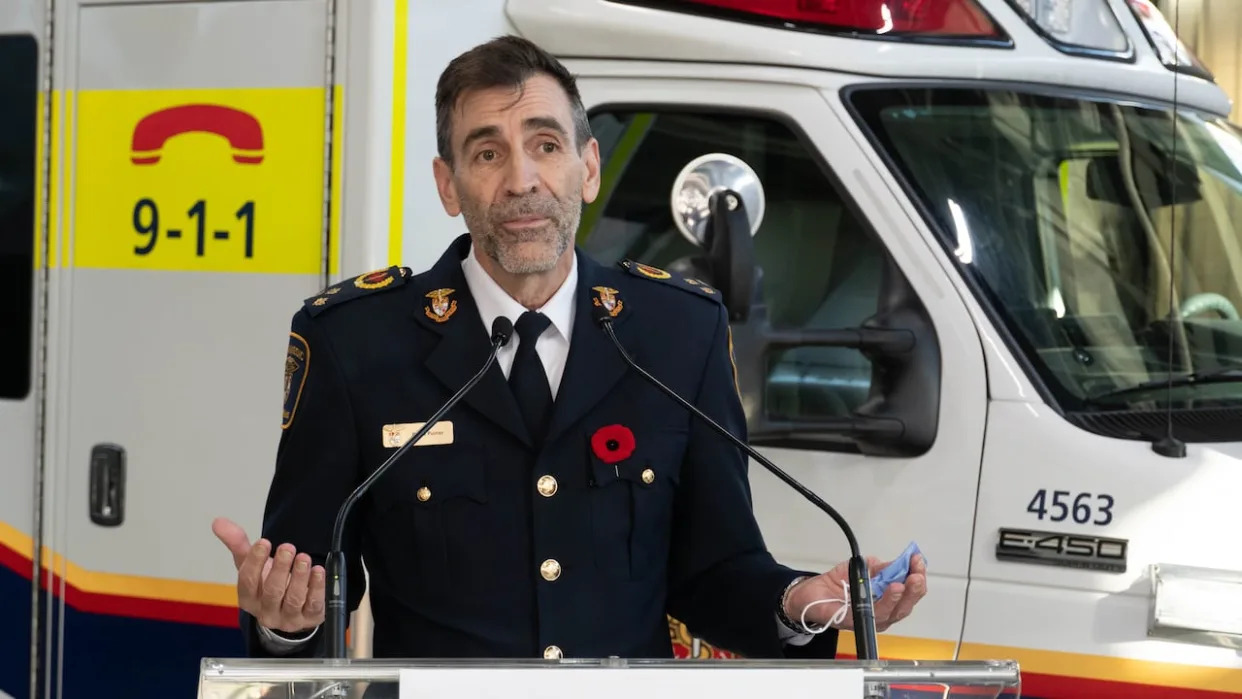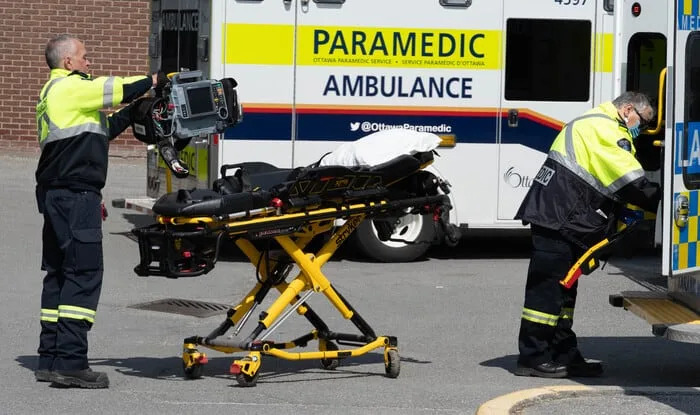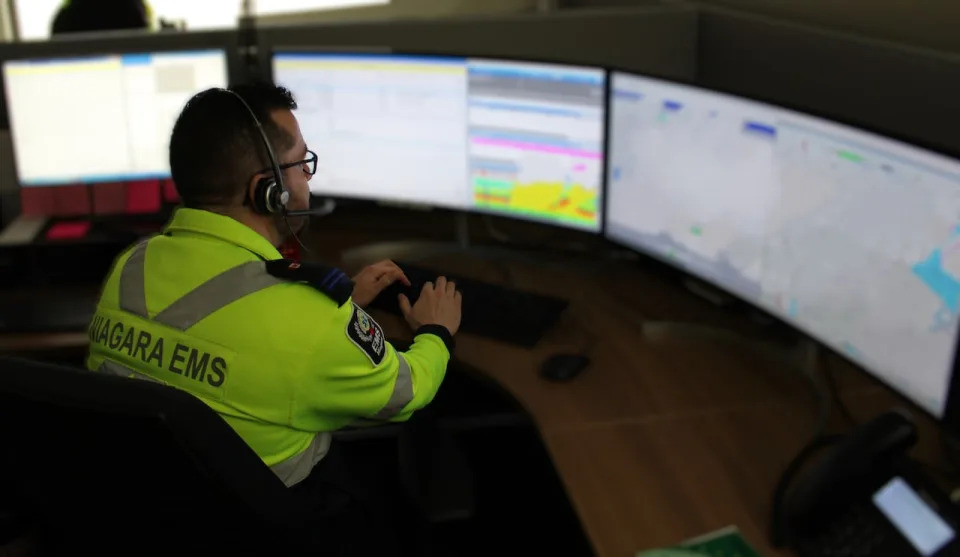CBC
Wed, May 29, 2024

Ottawa's paramedic Chief Pierre Poirier says he's already working on other options to solve the considerable strain put on paramedics by offload delays at hospitals. (Jean Delisle/CBC - image credit)
A "frustrating" refusal by the province has not weakened the city's resolve to launch a taxis-as-ambulances pilot project, Ottawa's paramedic chief told reporters on Wednesday, explaining that an opportunity may be hiding in what the ministry didn't say.
The City of Ottawa proposed the pilot last autumn as a way to offset the hours paramedics are waiting at overcrowded emergency rooms. These delays lead to "code zero" events where no ambulance is available for calls.
The trial would have allowed paramedics to send patients with non-serious injuries to hospital in a taxi instead.
"That kind of creative solution is exactly what we need," said Mayor Mark Sutcliffe. "So, I was a little bit surprised by the fact that the province wasn't in agreement."
The news was also disappointing to Pierre Poirier, chief of the Ottawa Paramedic Service, but in that rejection he saw an opportunity.
"We haven't given up on it," he said. "What it said in the letter is not to use 911 paramedics to provide that service. Sometimes it's what is said versus what is not said."
Poirier said he doesn't know the rationale for the rejection, but is exploring using community paramedics instead.
Unlike paramedics who respond to emergency calls, provincially funded community paramedics help with preventative care including, for instance, helping people who have been discharged after surgery.

Paramedics prepare their equipment in the parking lot of the Civic Hospital campus.
The Ottawa Paramedic Service application to the province suggested using 911 paramedics to call taxis for patients who don't have serious injuries. Now it's working on an alternative involving community paramedics. (Jean Delisle/CBC)
Program would be an Ontario first
This taxi program would be a first in Ontario, according to both Poirier and the province.
The Niagara region uses a different model, where dispatchers can provide 911 callers with a taxi option.

In Niagara, when a 911 call comes in, dispatchers ask questions to determine the seriousness of the emergency. If they find it's safe for the caller to wait, they transfer the call to a nurse.
In Niagara, 911 dispatchers can offer to provide callers with a taxi instead of an ambulance. (Submitted by Niagara Region Public Health and Emergency Services)
Poirier said that's another option the city is ready to explore.
"We look forward to reviewing their revised proposal," said Hannah Jensen, a spokesperson for Ontario's health minister.
The mayor said he's hopeful that the province will work with the paramedic chief to find a solution.
So is Poirier.
"It is frustrating, but often change takes time. We have to build relationships. We have to understand the perspective of the Ministry of Health. We're committed to working together with them to find solutions," Poirier said.
"What we propose is not always successful, and we have to find other ways of being creative."

Ottawa's paramedic Chief Pierre Poirier says he's already working on other options to solve the considerable strain put on paramedics by offload delays at hospitals. (Jean Delisle/CBC - image credit)
A "frustrating" refusal by the province has not weakened the city's resolve to launch a taxis-as-ambulances pilot project, Ottawa's paramedic chief told reporters on Wednesday, explaining that an opportunity may be hiding in what the ministry didn't say.
The City of Ottawa proposed the pilot last autumn as a way to offset the hours paramedics are waiting at overcrowded emergency rooms. These delays lead to "code zero" events where no ambulance is available for calls.
The trial would have allowed paramedics to send patients with non-serious injuries to hospital in a taxi instead.
"That kind of creative solution is exactly what we need," said Mayor Mark Sutcliffe. "So, I was a little bit surprised by the fact that the province wasn't in agreement."
The news was also disappointing to Pierre Poirier, chief of the Ottawa Paramedic Service, but in that rejection he saw an opportunity.
"We haven't given up on it," he said. "What it said in the letter is not to use 911 paramedics to provide that service. Sometimes it's what is said versus what is not said."
Poirier said he doesn't know the rationale for the rejection, but is exploring using community paramedics instead.
Unlike paramedics who respond to emergency calls, provincially funded community paramedics help with preventative care including, for instance, helping people who have been discharged after surgery.

Paramedics prepare their equipment in the parking lot of the Civic Hospital campus.
The Ottawa Paramedic Service application to the province suggested using 911 paramedics to call taxis for patients who don't have serious injuries. Now it's working on an alternative involving community paramedics. (Jean Delisle/CBC)
Program would be an Ontario first
This taxi program would be a first in Ontario, according to both Poirier and the province.
The Niagara region uses a different model, where dispatchers can provide 911 callers with a taxi option.

In Niagara, when a 911 call comes in, dispatchers ask questions to determine the seriousness of the emergency. If they find it's safe for the caller to wait, they transfer the call to a nurse.
In Niagara, 911 dispatchers can offer to provide callers with a taxi instead of an ambulance. (Submitted by Niagara Region Public Health and Emergency Services)
Poirier said that's another option the city is ready to explore.
"We look forward to reviewing their revised proposal," said Hannah Jensen, a spokesperson for Ontario's health minister.
The mayor said he's hopeful that the province will work with the paramedic chief to find a solution.
So is Poirier.
"It is frustrating, but often change takes time. We have to build relationships. We have to understand the perspective of the Ministry of Health. We're committed to working together with them to find solutions," Poirier said.
"What we propose is not always successful, and we have to find other ways of being creative."
No comments:
Post a Comment